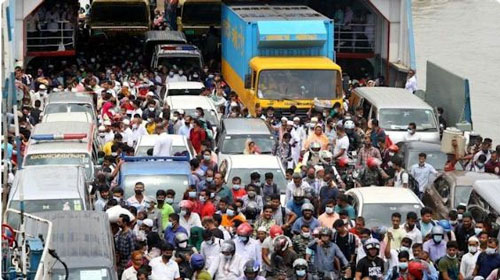Crowds
Crowds of people have flocked to Dhaka’s ferry terminals to try and get out of the city before a strict national lockdown comes into force.
For seven days from Monday, no one in Bangladesh will be allowed to leave their homes unless in an emergency.
As a result, people are fleeing the busy capital city for their homes in towns and villages. Covid cases in the country have surged, many linked to the Delta variant first identified in neighbouring India.
The latest wave of the virus in Bangladesh began about six weeks ago. On 15 May there were 261 new cases and 22 deaths reported. On Friday there were 5,869 new cases and 108 deaths – the country’s second-highest daily death toll of the whole pandemic.
Many hospitals are overwhelmed with patients and are struggling to cope, particularly those on the border with India.
Because of the sharp rise in cases, rail and bus services are already suspended, with an exception for emergency services.
People hoping to leave the city have resorted to hiring private hire vehicles, or even walking, because of the transport closures.
A statement released by Bangladesh’s Press Information Department (PID) said all offices, including government, semi-government and private offices, would also shut.
BBC South Asia editor Jill McGivering reports that low-income workers and day labourers will be among the worst hit by the stringent lockdown.
Health department spokesman Robed Amin told AFP news agency police and border guards would be deployed to enforce the lockdown and stop people from leaving their homes.
He added that the army could also be deployed if needed. “It is a dangerous and alarming situation,” he said. “If we don’t contain it now, we will face an India-like situation.”
A second wave of Covid infections, driven largely by the Delta variant, devastated India in April and May. Although the country is beginning to reopen, experts have warned it could see a third wave in the next few months.
Infection rates have been rising sharply since mid-May in Bangladesh, home to around 170 million people.
On Friday the government recorded almost 6,000 new cases and 108 fatalities, the second-highest death toll yet in the pandemic.
Authorities say the situation in districts near the Indian border is catastrophic, with hospitals in the cities of Khulna and Rajshahi overwhelmed.
Infection numbers in India have fallen sharply in recent weeks, with fewer than 50,000 new cases reported on Friday, down from more than 400,000 daily in early May.
But authorities in the western Indian state of Maharashtra on Friday tightened restrictions because of concerns about a new variant, Delta plus, around 50 cases of which have been reported nationwide.
Moreover, Indian police said Friday that around 2,000 people were injected with fake COVID-19 vaccines in Mumbai, and another 500 — some of them disabled — may have suffered the same fate in a second major city.
Vaccination rates rose sharply this week after the Indian government made shots free following a devastating pandemic surge in April and May.
Police in Mumbai said that around 2,000 people who thought they were being vaccinated were in fact injected with a saline solution.
Ten people have been arrested including two doctors at a private hospital in the financial hub, police told a news conference, with the scammers targeting residents of an upscale housing complex in one case.
“We (then) discovered that eight more camps were organised by this syndicate,” said Vishwas Patil, joint commissioner for the law and order division. Police have recovered 1.24 million rupees ($16,700) in cash which was “fraudulently obtained” by the accused.—AFP










